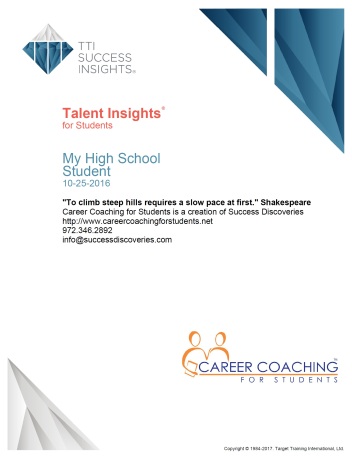 With any assessment used for career matching, it is important that it be valid and reliable. It is also important that it be applied with that same care. When you add age as a criteria, you are simply being more specific about validity and reliability – that is – you are wanting the assessment, the output or report and the process to be valid and reliable for the typical 14 year old.
With any assessment used for career matching, it is important that it be valid and reliable. It is also important that it be applied with that same care. When you add age as a criteria, you are simply being more specific about validity and reliability – that is – you are wanting the assessment, the output or report and the process to be valid and reliable for the typical 14 year old.
A Validity score is simply stating how accurately the assessment is for what it measures. A Reliability score is simply stating how accurately the assessment measures the same thing over time. More info on validity and reliability here.
With the Career Coaching for Students™ program for 14 year olds, we use two assessments that measure behavioral style and personal motivation (personal interests, attitudes and values). Behaviors and Motivators are two areas of talent that have extensive career matching data and are two areas that employers look at with assessments to determine job matching of candidates. The assessment we use, Talent Insights for Students™, is highly engaging and serves to bring exceptional clarity about the students strengths and interests based on behavioral style and personal motivators. For both areas measured, the validity and reliability for anyone who has an 8th grade or higher reading ability is very strong.
The next concern is about the assessment output or client report. Any assessment that produces a simple list of job titles is not going to be helpful. In fact, it can be damaging or at the least discouraging. Without guidance, many teens will “check out” once they receive a list of job titles that appear to be nonsensical, even if buried in the list are some good possibilities. One or two erroneous, nonsensical job titles or a list of 50 titles without a way to reduce the list most likely invalidates the entire list from the student’s perspective. Engaging the student means giving them information and a process for working with that information.
An excellent assessment report will provide insight to the student in a manner that produces very high “face validity”. Face validity is the simple reading and agreeing by the recipient. From the parent’s perspective, parts of the Talent Insights for Students report, specifically the behavioral section, will be easily validated this way by the parent. However, parents report learning a great deal about their child when they read sections of the report that cover the student’s personal interests, attitudes and values. The typical statement by parents that we hear is “I had never thought of that before but now it makes perfect sense“. These personal interests and values are sometimes called the “hidden motivators” only because they aren’t easily recognized when observing the behaviors of a person. A person’s motivators tell us why they do something. A person’s behavioral style tells us how they do something (observable).
The next critical component for 14 year olds is the career evaluation process. The process or steps the student [and career counselor] is provided in the program guidebook should empower the student to easily narrow the entire world of opportunity. Through a proven and easy-to-follow process, the student identifies career possibilities from their behavioral style and motivators. The goal of the process is to filter a larger list of high-potential possibilities into three to five high-potential career options that they are “positively curious” about. The student then performs high-level research on each to determine a top interest with 2 or 3 strong backup career interests. Students use the #1 choice to dive deep on the research, talk to people in the career, job shadow, flush out education requirements, college major, best school choices, etc. At any time they can switch to their #2 or #3 choice knowing any of the choices are a strong match to their talent profile.
The key for the 14 year old is that the assessment is valid and reliable with 8th grade reading comprehension, the output provides an excellent opportunity to build self-awareness and the process is engaging and valid from the students’ perspective. Studies show the behavioral style and motivational design of an individual is well developed and relatively stable by the teen years. The student’s behavioral style may shift slightly by the time they graduate high school but not much. This slight behavioral shift will not alter the usefulness of the career interest process used in the Career Coaching for Students™ program.
Want more information about Career Coaching for Students? Let us know!
Carl Nielson is the founder of Success Discoveries and creator of the Career Coaching for Students program. Carl is also a consultant to large, multi-national companies and small-family-owned businesses, providing applicant assessments, executive coaching and organizational development services.


